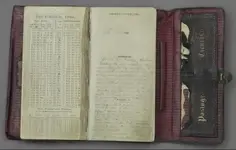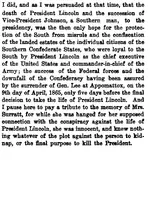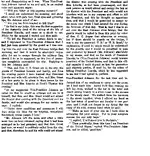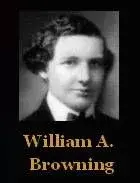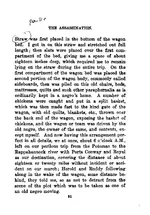This is from the diary of John Surratt, It is a very descriptive detail of who was in the room with him discussing Lincoln's demise. I can not imagine in any way that John Wilkes Booth was the man directing the group of Knights on what the plan was. He was in the room with his mouth shut and his ears open like the rest of the crew as they all received direction from those higher up in society.
"Solemn, very solemn, indeed, was the occasion —
horribly binding that obligation—fearfully terrible the
penalty ; but it is over now, and I know the secret
—
at least, am acquainted with some of the awful mysteries
which overshadow the whole.
What a crowd ! what a congregation ! The outside
world would never believe that, in that dark room,
there were to have been found men of all grades of
^society. But it is true ; and the mighty machine, when
it. begins to move, will permeate through all the stratus
of official life. Cabinet members, high in office, were
there ; and so, also, the unsuccessful actors, who seek
elsewhere the fame they failed to secure on the mimic
stage—eminent Judges, who now, by their decisions,
influence the destinies of the nation ; and editors, who
wield a mightier weapon than the sword, and hold a
lever that moves the world—Congressmen, who pretend
to make our laws ; and roughs, who never fail to break
them. All these were there, for I saw them. It was
a strange union of opposing elements; but they all
have their part to play in the drama of the " Coming
Future," and I, among the number." John Surratt
L.C. Baker
I saw, there, many a familiar face, both of politician
and prize-fighter;
those who frequent the National
Capital during the sessions of Congress, hang around
the great halls of National Legislation, and appear
daily in such style on Pennsylvania Avenue. John
asserts that every one of these men will yet be needed
;
for, in the great cause, all are equal, and they will each
have their respective work to do. Had I but been told
one-half of what is now known to me, it would have
then seemed a fallacy, an impossibility.
July 4, 1864.—The North—The cruel, blood-thirsty
North—will find that in spite of all its boasts and
glorifying, the South is not yet dead. Lincoln may
advance his Hessian troops on every side ; but still he
will find a determined foe. It may take strongholds
and capture cities ; but that does not end the war.
While there is a man in the South, that man will fight.
They will not conquer the South, much as they may
rejoice to-day.
We have yet a hope that the Democratic
party of the North will do us justice, and, in the
coming election, show Abraham Lincoln that his usurpation
and despotism is displeasing to the people.
[The entries under dates between August 13 and
August 23, are merely records of current events, and
a statement that
he had visited Richmond ; but
no remark is made as to the object of that visit.
August 30, 1864.—
Received a dispatch to-day from
Canada. Should have started but was warned to be
cautious.
Shall leave to-morrow.
[Here one of those breaks that we have before
noticed takes place in the Diary, and is explained by
subsequent entries.
—
Editor.]
September 6, 1864.—Have learned something this
trip at any rate ;
and, if only successful, we will bring
the war home to the hearths of the Northerners, and
cause them to feel a little of what the South has suffered.
The cities of Boston, Philadelphia and New
York are to be burned ; a raid is to be made from
Canada upon the shipping of the lakes, and a force of
men are to rush across the border and attack the
frontier towns. The prisoners at Johnson's Island are
also to be released, and join in the affair. The princi-
pal parties who are to engage in this work are now in
Canada, and I have seen the leaders. The whole of
this grand scheme is to be carried out on the same
day, if possible, so as to create an universal panic, and
to make the people call on the Government for peace.
September 7, 1864.—So the news has reached Washington
that Morgan has been killed and his band
routed. If the Canadian scheme is successful, that
death, with the many others of good Southern men,
will be fully avenged.
September 8, 1864.—no news yet of the proposed
scheme. It cannot have failed. What can cause the
delay ?
September 12, 1864.—
Have been on to New York.
Have learned that they have received instructions to
to await more direct orders from Canada, before commencing
the work. The movement on the lakes is to
be tried first. It would have been better to have
carried it out all at one time ; but it is feared that they
have not sufficient force to engage in all the enterprises.
Have received despatches to that effect for
Richmond.
Should the elections fail us, we shall have to resort to
some more efficient method to get rid of Lincoln.
November 5, 1864.—New York seemed almost certain
for us, and we counted on her ; but a change in
the programme of Lincoln may lose us that city, as
there is some military movement going on that
neither Booth nor I can readily make out.
November 6, 1864.—Butler has been ordered to New
York City. What for? Is our plan known ? It would
be useless to attempt anything while he is there.
" "Watch and wait" must be our motto for the present.
November 10, 1864.—The armies are going into Winter
quarters; the dreaded Butler has left New York,
and now is our time to begin.
I must leave for
Canada tomorrow for instructions.
November 23, 1864.—Have seen T and Mel)
in Canada. The work is to commence at once.
says I am to remain at Washington and operate thence,
if an opportunity can be found.
I would have liked
to have been engaged in the New York work; but it
is thought in Canada that I should do better Here.
(This is about the time that the money and Knights came to New York City)
November 25, 1864.—A telegram just received from
Mrs. that "Rob. and his men have work, which
is expected to
pay well." Good! Then this night
will tell the tale.
Every failure which may attend ova operations now,
will add all the more to the final day of reckoning, when
the Western wood-chopper will have to pay up for all
the short comings.
Vecerfibetr 10, 1864.—The
Richmond authorities are
far from pleased at the course tidings have taken, and
threaten to stop the supplies unless something more
definite is carried out. Have despatches ready for
Canada.
January 15, 1865.—Booth and Mudd were with me
today at the "National." That fellow W was
there. I would like to trust him, hut dare not. We
have planned out the roads to he taken, if we only
succeed in capturing Lincoln.
March 1, 1865.—The inauguration must take place.
There are no means of reaching him before. The best
laid scheme seems blocked on every side. But the
opportunity will yet come. Well, better late than
never.
March 2, 1865.—
Have arranged all our plans, and
secured the desired assistance. Booth is desperate
so are
the others. They all seem ready to do any
thing to secure success. I don't think that young fellow
Harold has much courage ; but, then, he may be made
of use by-and-by. The risk is great, but the reward
greater. We have all we want for the work—everything
except the opportunity.
March 5, 1865.—Lincoln attends a review on the
7th. We have it all arranged now, and nothing
can fail. He goes out unattended, and we shall be
enough—
seven of us. The suddenness of the whole
thing will prevent any attempt at rescue until it is too
late. And once safely in Richmond, the independence
of the South is certain, and my fortune made.
March 18, 1865.—Booth called to-day and told me
that he had gotten together in Washington all who
were necessary for the purpose intended ; that they
could be ready at a minute's notice. He had a long
conversation with Mother, at the end of which he said
that "if anything was to be done, it should not be delayed,
otherwise Tt would be too late." He declared
his intention of
going on to New York at once to perfect
matters.
March 19, 1865.—Secured rooms for "Wood" at the
" Herndon." That is as good a name as any other for
him to go under here. W and I went together.
It was a good idea that we had of saying the rooms
were wanted for a sick man—his non-appearance at
table will not therefore excite suspicion. If seen, he
would not be thought very delicate in health.
Booth left to-day for New York. We agreed upon
a first rate cypher to send by telegraph, so that we
might know what each other was doing, without
letting any one else into the secret. All seems likely
to go on well.
March 21, 1865.—No news yet received from Booth.
I do not understand this.
What can he be doing? (receiving instructions in New York?)

April 11, 1865.—
Have received the necessary funds,
and shall start tomorrow for Washington, to join
Booth in his scheme.
April 15, 1865.—Lincoln is gone at last. Booth has
carried out his oft-repeated threat, and has, so it is
said, really taken the life of the tyrant. It seems too
good to be true. But the " assassin"—Savior—is being
pursued.
If he takes the road planned out, he
will certainly escape. He has indeed gained an
immortality of fame.
[From this time forward the diary is very. irregularly
kept, at times full of records of events and passing
thoughts, at others containing brief entries, with long
intervals between them. Regrets and self praise,
together with eulogies of the Confederates in Canada,
&c, form the greater portion of the work, showing
that, whenever distressed in mind or elevated in spirits,
he generally relieved both, by writing in his Diary.
Only those items that have been considered of general
interest have been selected, in order to trace the career
of the Conspirator, and to show the state of his mind
from the time of the Assassination until the close of
the Record. The rambling remarks and unimportant
entries are therefore excluded.
—
Editor.] Sounds like any further comment has been censored from the diary to me. L.C. Baker
It is interesting that Texas Ranger Walker, was the man Texas rededicated Walker County to after Governor R.J. Walker backed out on supporting the Lecompton Constitution in Kansas.




